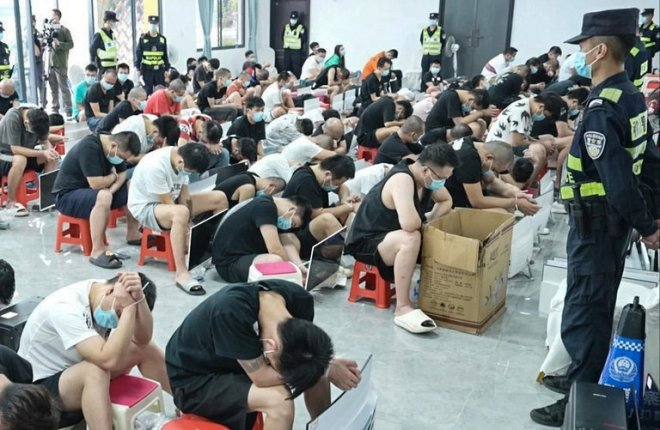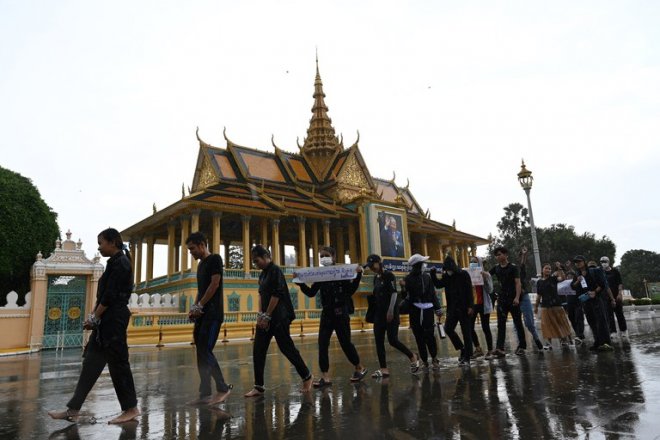Malaysian, Japanese coast guards hold South China Sea security drill
The Japan Coast Guard on Friday concluded security drills to train its Malaysian counterpart on how to repel foreign intruders in the disputed South China Sea where Beijing has grown increasingly assertive against other claimant states.
The four-day exercise marked the first time Malaysia was trained in using long-range acoustic devices, called sound cannons, said Saiful Lizan Ibrahim, Malaysian Maritime Enforcement Agency’s deputy director of logistics.
“The drill was conducted to train the officers and members on how to use the device and also to test its effectiveness against foreign ships, especially the ones that intrude into the country’s waters,” Saiful said in a statement.
“It is to be used to chase away intruder ships that refuse to cooperate or the ones that are acting aggressively toward us.”
Long-range acoustic devices are specialized loudspeakers that can produce sounds at high power to communicate across vast distances. They are an upgrade from the devices used in Malaysia.
The Japanese government contributed four of the sound cannons to Malaysia. The devices will be mounted on maritime agency’s offshore patrol boats, Saiful said.
Japanese official Tamura Makoto told the Tokyo public broadcaster NHK that his country would continue to work with Southeast Asian counterparts.
“Southeast Asia has sea lanes vital to Japan. We will continue to support nations in the region so that they can better ensure maritime safety,” he said in a report published Friday.
Unlike Malaysia, Japan is not a direct party to the South China Sea dispute with China, but is an interested stakeholder.
“Japan’s first interest in the South China Sea is to ensure that international trade passes smoothly through the region,” says a paper written in October by H.D.P. Envall at Australian National University, who cites Alessio Patalano’s book “Japan as a Maritime Power.”
“Approximately 80% of Japan’s energy imports travel through the South China Sea and much of its trade as well,” the paper said.
Territorial disputes
Japan is locked in its own dispute with China in the East China Sea, particularly over the Senkaku Islands.
As for the South China Sea, Beijing claims almost all of it, including waters within the exclusive economic zones of Brunei, Malaysia, the Philippines, Vietnam and Taiwan. While Indonesia does not regard itself as a party to the dispute, Beijing claims historic rights to parts of the sea overlapping Indonesia’s EEZ as well.
Meanwhile, Beijing has ignored a 2016 international arbitration court ruling won by Manila that invalidated China’s vast claims in the South China Sea.
According to the Malaysian government audit report published in 2020, the latest one available, Chinese coast guard and navy ships intruded into Malaysian waters in the South China Sea 89 times between 2016 and 2019. Those ships remained in the region until they were turned away by the Malaysian navy.
Indonesia, Vietnam and Malaysia have accused China of disrupting their oil and gas exploration activities with frequent incursions by Chinese coast guard and maritime militia ships, leading to confrontations and incidents.
All such activities by Beijing are “viewed from Japan’s perspective as part of a single strategy by China intended to weaken the territorial claims and control of other states in the area and establish its own control,” says the paper by ANU’s Envall.
“Japan also faces similar grey zone tactics – attempts at coercion that fall just below what is considered an ‘armed attack’ – in the East China Sea,” the paper says.
Like with Malaysia, Japan is also enhancing ties with South China Sea claimants, the Philippines and Indonesia.
China will view ‘exercises with suspicion’
Malaysia’s coast guard lacks maritime patrol, emergency response and enforcement resources, so it has acquired assistance from several partners, including Japan and Australia, said Hoo Chiew Ping, senior lecturer in Strategic Studies and International Relations at the Universiti Kebangsaan.
“Thus, the acoustic devices to be provided by Japan will increase MMEA’s detection capability and provide a warning system to our fishermen to reduce the risks of maritime clash or confrontation with foreign vessels in our waters,” she told RFA-affiliate BenarNews.
The drills with Japan will definitely invite China’s suspicion, said Shahriman Lockman, a director at Malaysia’s Institute of Strategic and International Studies.
“China would naturally view such exercises with suspicion. They will doubtless express their dismay, even if unofficially, to Malaysian government officials. This is only to be expected,” Lockman told BenarNews.
“At the same time, China must surely understand at some level that Malaysia needs to build the capacity to defend itself.”
Lockman noted China has a persistent presence in Malaysia’s EEZ in the South China Sea.
“Periodically, a China Coast Guard vessel will convey China’s objections to Malaysia’s oil and gas activities in the Luconia Shoals area, particularly the Kasawari Gas Development Project,” he said.
“China’s presence has become the new normal and is usually shadowed by Malaysian government vessels. There are occasional tensions but these seem to be moderated and kept under control.”
BenarNews is an RFA-affiliated news service
[圖擷取自網路,如有疑問請私訊]
The four-day exercise marked the first time Malaysia was trained in using long-range acoustic devices, called sound cannons, said Saiful Lizan Ibrahim, Malaysian Maritime Enforcement Agency’s deputy director of logistics.
“The drill was conducted to train the officers and members on how to use the device and also to test its effectiveness against foreign ships, especially the ones that intrude into the country’s waters,” Saiful said in a statement.
“It is to be used to chase away intruder ships that refuse to cooperate or the ones that are acting aggressively toward us.”
Long-range acoustic devices are specialized loudspeakers that can produce sounds at high power to communicate across vast distances. They are an upgrade from the devices used in Malaysia.
The Japanese government contributed four of the sound cannons to Malaysia. The devices will be mounted on maritime agency’s offshore patrol boats, Saiful said.
Japanese official Tamura Makoto told the Tokyo public broadcaster NHK that his country would continue to work with Southeast Asian counterparts.
“Southeast Asia has sea lanes vital to Japan. We will continue to support nations in the region so that they can better ensure maritime safety,” he said in a report published Friday.
Unlike Malaysia, Japan is not a direct party to the South China Sea dispute with China, but is an interested stakeholder.
“Japan’s first interest in the South China Sea is to ensure that international trade passes smoothly through the region,” says a paper written in October by H.D.P. Envall at Australian National University, who cites Alessio Patalano’s book “Japan as a Maritime Power.”
“Approximately 80% of Japan’s energy imports travel through the South China Sea and much of its trade as well,” the paper said.
Territorial disputes
Japan is locked in its own dispute with China in the East China Sea, particularly over the Senkaku Islands.
As for the South China Sea, Beijing claims almost all of it, including waters within the exclusive economic zones of Brunei, Malaysia, the Philippines, Vietnam and Taiwan. While Indonesia does not regard itself as a party to the dispute, Beijing claims historic rights to parts of the sea overlapping Indonesia’s EEZ as well.
Meanwhile, Beijing has ignored a 2016 international arbitration court ruling won by Manila that invalidated China’s vast claims in the South China Sea.
According to the Malaysian government audit report published in 2020, the latest one available, Chinese coast guard and navy ships intruded into Malaysian waters in the South China Sea 89 times between 2016 and 2019. Those ships remained in the region until they were turned away by the Malaysian navy.
Indonesia, Vietnam and Malaysia have accused China of disrupting their oil and gas exploration activities with frequent incursions by Chinese coast guard and maritime militia ships, leading to confrontations and incidents.
All such activities by Beijing are “viewed from Japan’s perspective as part of a single strategy by China intended to weaken the territorial claims and control of other states in the area and establish its own control,” says the paper by ANU’s Envall.
“Japan also faces similar grey zone tactics – attempts at coercion that fall just below what is considered an ‘armed attack’ – in the East China Sea,” the paper says.
Like with Malaysia, Japan is also enhancing ties with South China Sea claimants, the Philippines and Indonesia.
China will view ‘exercises with suspicion’
Malaysia’s coast guard lacks maritime patrol, emergency response and enforcement resources, so it has acquired assistance from several partners, including Japan and Australia, said Hoo Chiew Ping, senior lecturer in Strategic Studies and International Relations at the Universiti Kebangsaan.
“Thus, the acoustic devices to be provided by Japan will increase MMEA’s detection capability and provide a warning system to our fishermen to reduce the risks of maritime clash or confrontation with foreign vessels in our waters,” she told RFA-affiliate BenarNews.
The drills with Japan will definitely invite China’s suspicion, said Shahriman Lockman, a director at Malaysia’s Institute of Strategic and International Studies.
“China would naturally view such exercises with suspicion. They will doubtless express their dismay, even if unofficially, to Malaysian government officials. This is only to be expected,” Lockman told BenarNews.
“At the same time, China must surely understand at some level that Malaysia needs to build the capacity to defend itself.”
Lockman noted China has a persistent presence in Malaysia’s EEZ in the South China Sea.
“Periodically, a China Coast Guard vessel will convey China’s objections to Malaysia’s oil and gas activities in the Luconia Shoals area, particularly the Kasawari Gas Development Project,” he said.
“China’s presence has become the new normal and is usually shadowed by Malaysian government vessels. There are occasional tensions but these seem to be moderated and kept under control.”
BenarNews is an RFA-affiliated news service
[圖擷取自網路,如有疑問請私訊]
|
本篇 |
不想錯過? 請追蹤FB專頁! |
| 喜歡這篇嗎?快分享吧! |
相關文章
AsianNewsCast





















